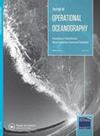印度洋风浪预报系统:开发与验证
IF 2.4
3区 地球科学
Q4 METEOROLOGY & ATMOSPHERIC SCIENCES
引用次数: 13
摘要
摘要:本研究旨在利用WAVEWATCH-III波浪模型开发印度洋风浪预报系统,并对其进行详细验证,以确保模型的可靠性。WAVEWATCH-III模式采用多网格方法,分辨率从100公里(全球网格)到4公里(沿海网格)不等,由ECMWF气象模式产生的10米风驱动。由浮标网络和Jason-2高度计提供的两个不同的观测数据集已被用于评估模式技能。波浪模型的可靠性分别在深水和沿海水域进行了测试,结果表明,2016年这两个地区的波浪模型都表现可靠(相关系数> 0.8,散射指数< 30%)。利用卫星数据进行的空间验证也支持了国际空间站预报的可靠性。在极端条件下的验证也表明,该模型对波高的预测精度较高,相关系数>0.9,散点指数< 20%。整体分析表明该模型的可靠性优于IO,因此该模型非常合适,可用于业务预测目的和其他海事服务。本文章由计算机程序翻译,如有差异,请以英文原文为准。
Indian Ocean wave forecasting system for wind waves: development and its validation
ABSTRACT Present study aims at the development of the Indian Ocean wave forecasting system for wind waves using WAVEWATCH-III wave model and a detailed validation of the same to ensure the model reliability for operational use. WAVEWATCH-III model has a multi-grid approach with resolution varying from 100 km (global grid) to 4 km (coastal grid), and is driven by the 10 m wind, produced by the ECMWF meteorological model. Two different observation data sets, provided by a network of buoys and Jason-2 altimeter, have been used for the evaluationof the model skill. The reliability of the wave model is tested separately for deep and for coastal waters, and reliable (correlation > 0.8 and Scatter Index < 30%) performance is found for both areas for the year 2016. A spatial validation using the satellite data also supported the reliability of the forecast in the IO. Verification during the extreme conditions also showed an accurate performance of the model in predicting the wave heights with correlation >0.9 and Scatter Index < 20%. The overall analysis endorses the model reliability over the IO, making this model very suitable, and hence it could be used for the operational forecasting purpose and other maritime services.
求助全文
通过发布文献求助,成功后即可免费获取论文全文。
去求助
来源期刊
CiteScore
7.50
自引率
9.70%
发文量
8
审稿时长
>12 weeks
期刊介绍:
The Journal of Operational Oceanography will publish papers which examine the role of oceanography in contributing to the fields of: Numerical Weather Prediction; Development of Climatologies; Implications of Ocean Change; Ocean and Climate Forecasting; Ocean Observing Technologies; Eutrophication; Climate Assessment; Shoreline Change; Marine and Sea State Prediction; Model Development and Validation; Coastal Flooding; Reducing Public Health Risks; Short-Range Ocean Forecasting; Forces on Structures; Ocean Policy; Protecting and Restoring Ecosystem health; Controlling and Mitigating Natural Hazards; Safe and Efficient Marine Operations

 求助内容:
求助内容: 应助结果提醒方式:
应助结果提醒方式:


